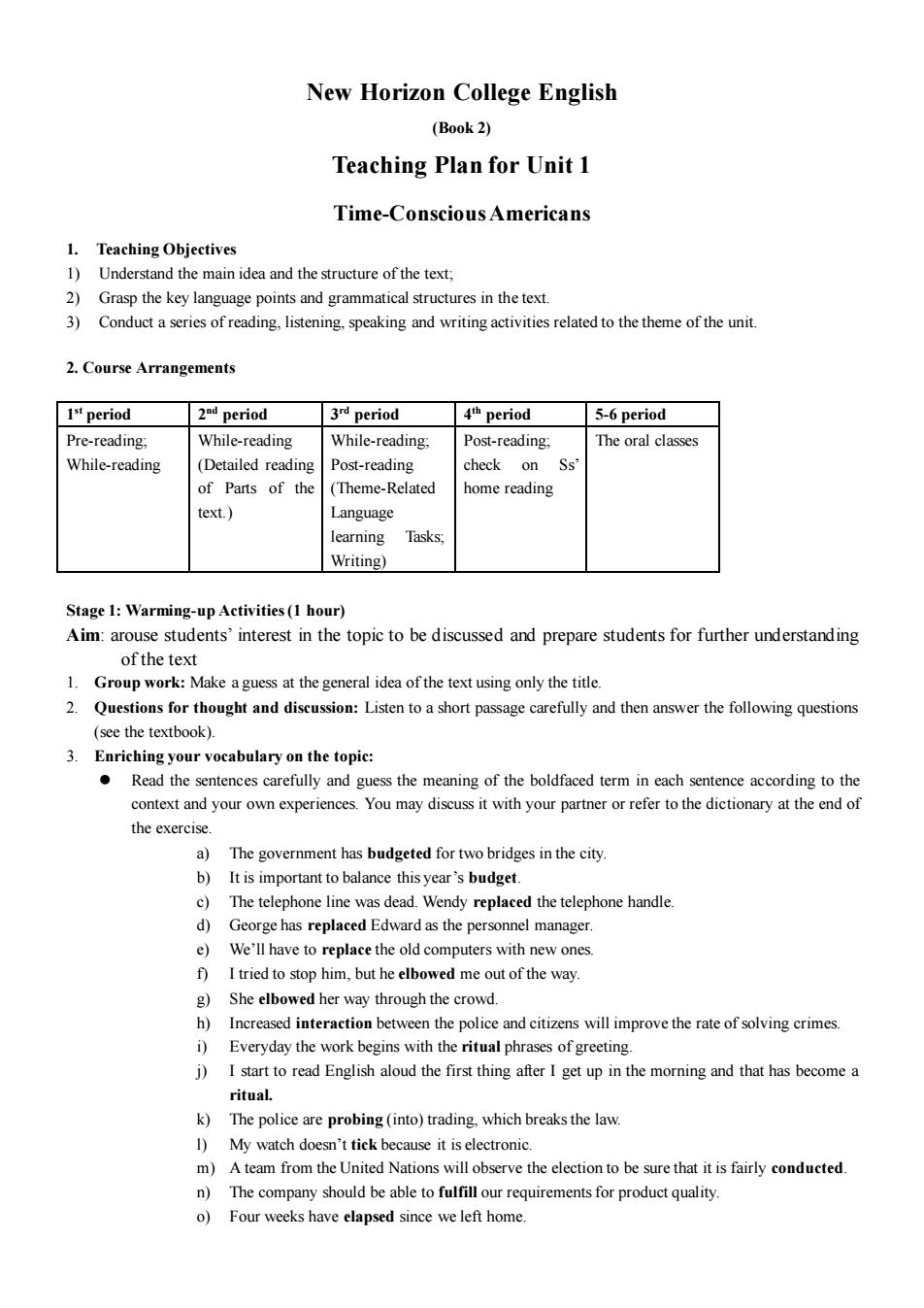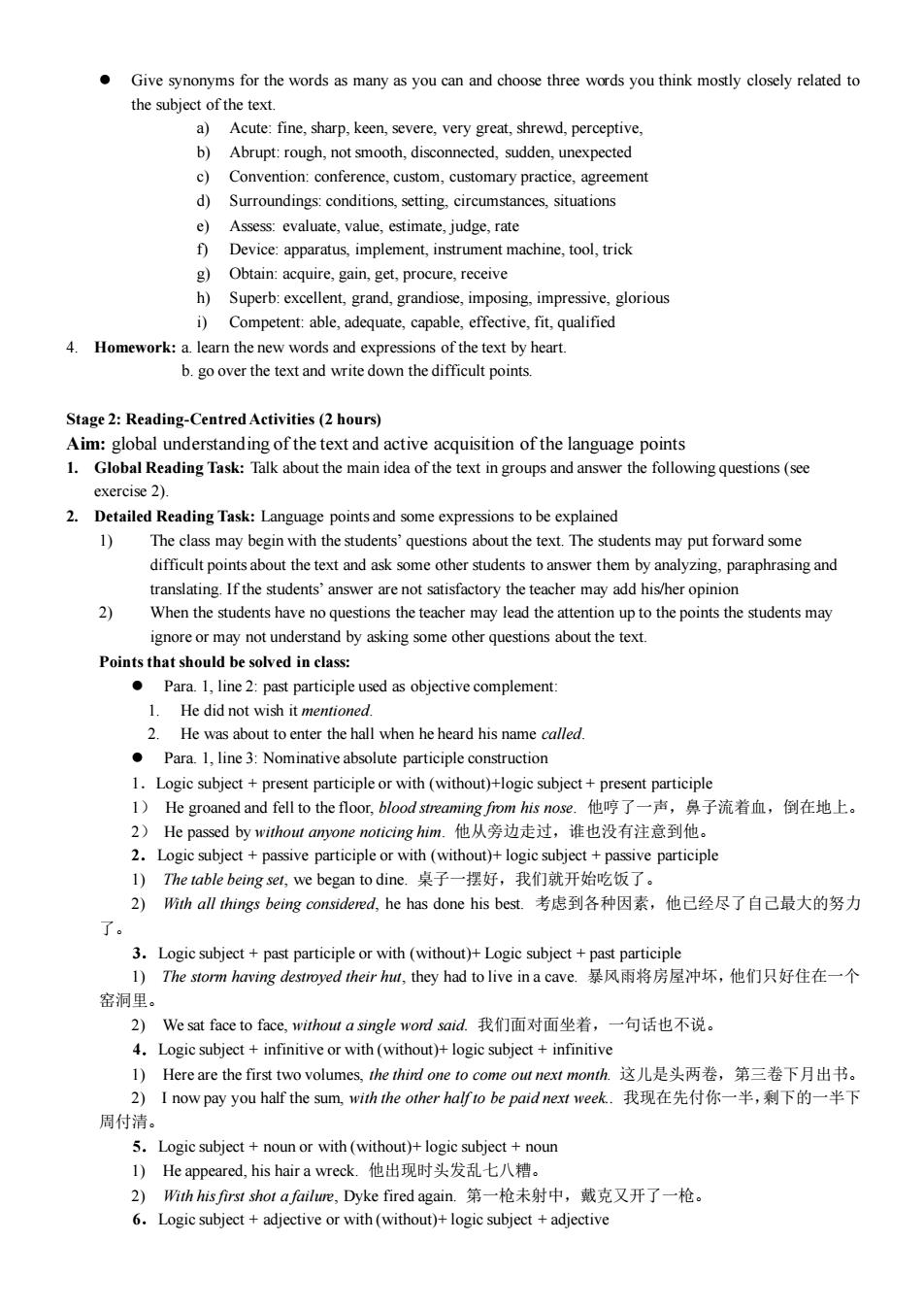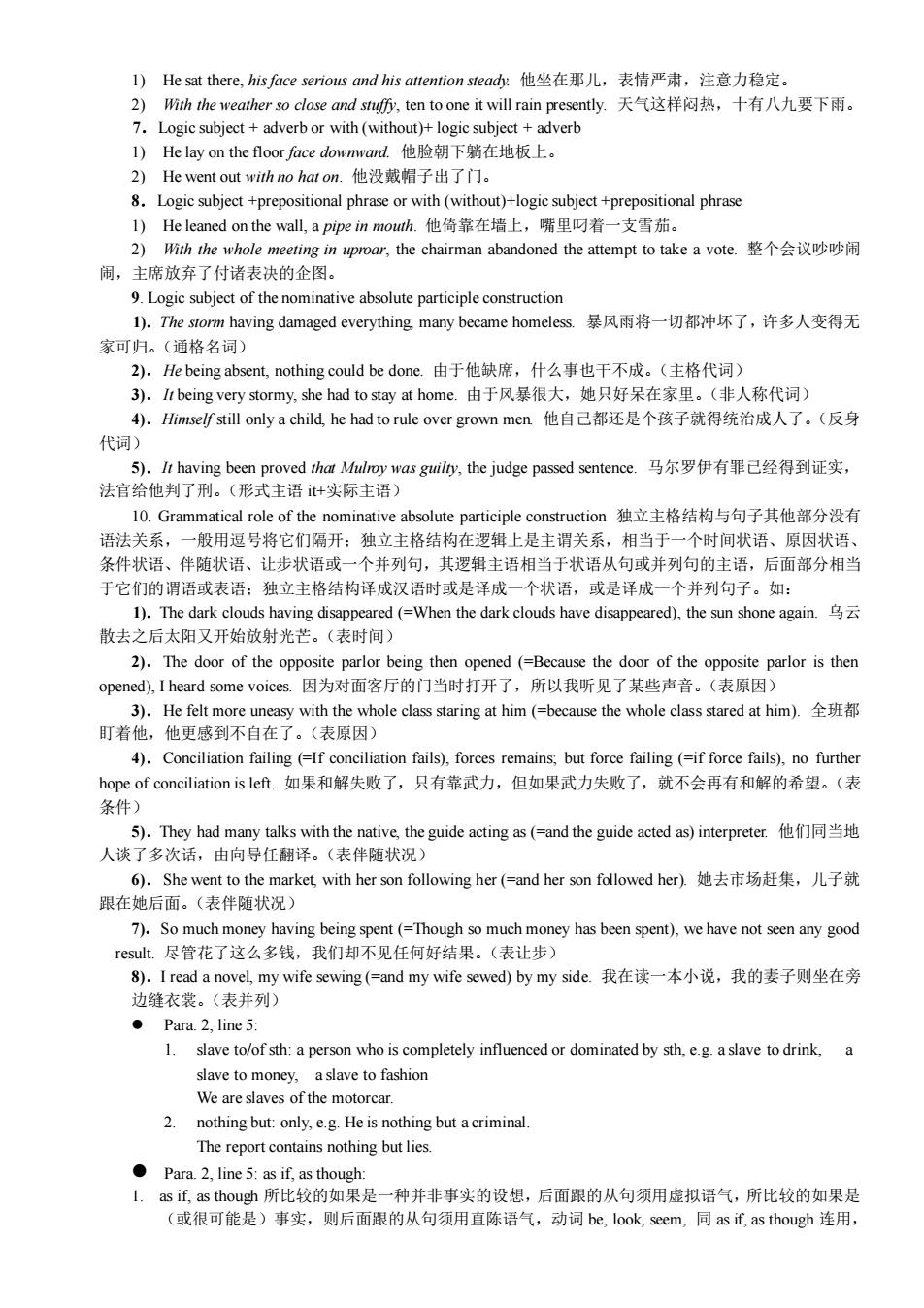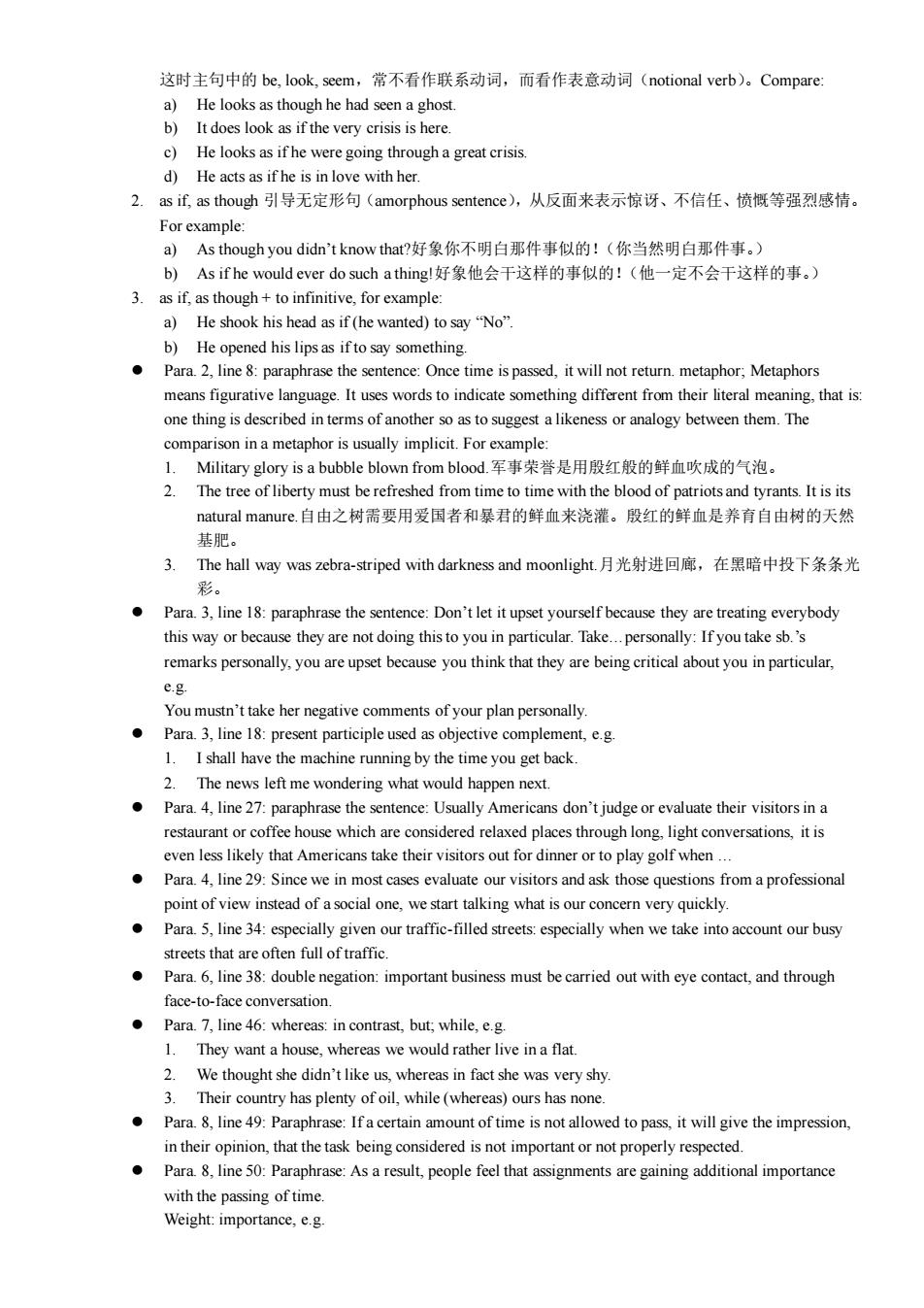
(2)课程名称:新视野大学英语
课程名称:新视野大学英语 (2)

New Horizon College English(Book 2)Teaching Plan for Unit 1Time-ConsciousAmericans1.TeachingObjectives1)Understand the main idea and the structure of the text,2)Grasp the key language points and grammatical structures in the text.3)Conduct a series ofreading, listening, speaking and writing activities related to the theme ofthe unit.2.Course Arrangements1st period2nd period3rd period4 period5-6 periodPre-reading,While-readingWhile-reading,Post-reading,The oral classesWhile-reading(Detailed readingPost-readingcheckSson(Theme-Relatedof Parts of thehomereadingtext.)LanguagelearningTasks;Writing)Stage l:Warming-up Activities (1 hour)Aim: arouse students' interest in the topic to be discussed and prepare students for further understandingofthetextGroup work: Make a guess at the general idea of the text using only the title.1.2.Questions forthought and discussion:Listen to a short passage carefully and then answer the following questions(seethetextbook)Enriching your vocabulary on the topic:3.Read the sentences carefully and guess the meaning of the boldfaced term in each sentence according to thecontext and your own experiences.You may discuss it with your partner orreferto the dictionary at the end ofthe exercise.a)The government has budgeted for two bridges in the cityb)It is important to balance this year's budgetc)The telephone line wasdead.Wendy replaced the telephone handle.d)GeorgehasreplacedEdwardasthepersonnelmanagere)We'll have to replace the old computers with new ones.f)I tried to stop him, but he elbowed me out of the way.g)She elbowed herway through the crowd.h)Increased interactionbetweenthepoliceand citizens will improvetherateof solving crimesi)Everyday the work begins with the ritual phrases of greeting.j)I start to read English aloud the first thing after I get up in the morning and that has become aritual.K)The police are probing(into)trading,which breaks the law.DMy watch doesn't tick because it is electronicm)AteamfromtheUnited Nations will observethe election to be sure that it isfairly conductedn)Thecompany shouldbeabletofulfill ourrequirementsforproductquality0)Fourweekshaveelapsed sincewelefthome
New Horizon College English (Book 2) Teaching Plan for Unit 1 Time-Conscious Americans 1. Teaching Objectives 1) Understand the main idea and the structure of the text; 2) Grasp the key language points and grammatical structures in the text. 3) Conduct a series of reading, listening, speaking and writing activities related to the theme of the unit. 2. Course Arrangements 1 st period 2 nd period 3 rd period 4 th period 5-6 period Pre-reading; While-reading While-reading (Detailed reading of Parts of the text.) While-reading; Post-reading (Theme-Related Language learning Tasks; Writing) Post-reading; check on Ss’ home reading The oral classes Stage 1: Warming-up Activities (1 hour) Aim: arouse students’ interest in the topic to be discussed and prepare students for further understanding of the text 1. Group work: Make a guess at the general idea of the text using only the title. 2. Questions for thought and discussion: Listen to a short passage carefully and then answer the following questions (see the textbook). 3. Enriching your vocabulary on the topic: ⚫ Read the sentences carefully and guess the meaning of the boldfaced term in each sentence according to the context and your own experiences. You may discuss it with your partner or refer to the dictionary at the end of the exercise. a) The government has budgeted for two bridges in the city. b) It is important to balance this year’s budget. c) The telephone line was dead. Wendy replaced the telephone handle. d) George has replaced Edward as the personnel manager. e) We’ll have to replace the old computers with new ones. f) I tried to stop him, but he elbowed me out of the way. g) She elbowed her way through the crowd. h) Increased interaction between the police and citizens will improve the rate of solving crimes. i) Everyday the work begins with the ritual phrases of greeting. j) I start to read English aloud the first thing after I get up in the morning and that has become a ritual. k) The police are probing (into) trading, which breaks the law. l) My watch doesn’t tick because it is electronic. m) A team from the United Nations will observe the election to be sure that it is fairly conducted. n) The company should be able to fulfill our requirements for product quality. o) Four weeks have elapsed since we left home

Give synonyms for the words as many as you can and choose three words you think mostly closely related tothe subject ofthetext.a)Acute: fine, sharp, keen, severe, very great, shrewd, perceptive,b)Abrupt: rough, not smooth, disconnected, sudden, unexpectedc)Convention:conference, custom,customary practice,agreementd)Surroundings:conditions, setting,circumstances, situationse)Assess: evaluate, value, estimate, judge, ratef)Device: apparatus, implement, instrument machine, tool,trickg)Obtain: acquire, gain, get, procure, receiveh)Superb: excellent, grand, grandiose, imposing, impressive, gloriousi)Competent: able, adequate, capable, effective,fit, qualified4.Homework:a.learn thenewwords and expressions of the text byheart.b.goover the text and writedown the difficult pointsStage 2: Reading-CentredActivities (2 hours)Aim:global understandingofthetextandactiveacquisitionofthelanguagepoints1.Global Reading Task: Talk about the main idea of the text in groups and answer the following questions (seeexercise 2).2.Detailed Reading Task: Language points and some expressions to be explained1)Theclassmaybeginwith thestudents'questions about thetext.The studentsmayputforward somedifficultpointsabout thetextand ask some other studentstoanswerthembyanalyzing,paraphrasingandtranslating.If thestudents'answerarenot satisfactorytheteachermayaddhis/heropinion2)Whenthestudents havenoquestions theteachermay lead the attention upto thepoints thestudents mayignore or may not understand by asking some other questions about the text.Points that should be solved in class:Para. 1, line 2: past participle used as objective complement:1.Hedidnotwish it mentioned.He was about to enter the hall when heheard his name called.2Para.1,line3:Nominative absoluteparticiple construction1. Logic subject +present participle or with (without)+logic subject+present participleHegroanedandfelltothefloor,blood streamingfiomhisnose.他哼了一声,鼻子流着血,倒在地上。1)2)Hepassedbywithoutanyonenoticinghim.他从旁边走过,谁也没有注意到他。2.Logic subject + passive participle or with (without)+ logic subject + passive participle1)Thetablebeingset,webegantodine桌子一摆好,我们就开始吃饭了。2)Withall thingsbeingconsidered,hehasdonehis best.考虑到各种因素,他己经尽了自己最大的努力了。3. Logic subject + past participle or with (without)+ Logic subject + past participle1)Thestormhavingdestroyedtheirhut,,theyhadtoliveinacave.暴风雨将房屋冲坏,他们只好住在一个窑洞里。2)We satfaceto face,withoutasingleword said.我们面对面坐着,一句话也不说。4.Logic subject+infinitive or with (without)+logic subject + infinitive1)Herearethefirsttwovolumes,thethind oneto comeout nextmonth.这儿是头两卷,第三卷下月出书。2)Inowpayyouhalf thesum,withtheotherhalftobepaid nextweek.我现在先付你一半,剩下的一半下周付清。5.Logic subject +noun or with (without)+logic subject +noun1)Heappeared,hishairawreck.他出现时头发乱七八糟。2)With hisfirst shotafailure,Dykefiredagain.第一枪未射中,戴克又开了一枪。6. Logic subject +adjective or with (without)+logic subject +adjective
⚫ Give synonyms for the words as many as you can and choose three words you think mostly closely related to the subject of the text. a) Acute: fine, sharp, keen, severe, very great, shrewd, perceptive, b) Abrupt: rough, not smooth, disconnected, sudden, unexpected c) Convention: conference, custom, customary practice, agreement d) Surroundings: conditions, setting, circumstances, situations e) Assess: evaluate, value, estimate, judge, rate f) Device: apparatus, implement, instrument machine, tool, trick g) Obtain: acquire, gain, get, procure, receive h) Superb: excellent, grand, grandiose, imposing, impressive, glorious i) Competent: able, adequate, capable, effective, fit, qualified 4. Homework: a. learn the new words and expressions of the text by heart. b. go over the text and write down the difficult points. Stage 2: Reading-Centred Activities (2 hours) Aim: global understanding of the text and active acquisition of the language points 1. Global Reading Task: Talk about the main idea of the text in groups and answer the following questions (see exercise 2). 2. Detailed Reading Task: Language points and some expressions to be explained 1) The class may begin with the students’ questions about the text. The students may put forward some difficult points about the text and ask some other students to answer them by analyzing, paraphrasing and translating. If the students’ answer are not satisfactory the teacher may add his/her opinion 2) When the students have no questions the teacher may lead the attention up to the points the students may ignore or may not understand by asking some other questions about the text. Points that should be solved in class: ⚫ Para. 1, line 2: past participle used as objective complement: 1. He did not wish it mentioned. 2. He was about to enter the hall when he heard his name called. ⚫ Para. 1, line 3: Nominative absolute participle construction 1.Logic subject + present participle or with (without)+logic subject + present participle 1) He groaned and fell to the floor, blood streaming from his nose. 他哼了一声,鼻子流着血,倒在地上。 2) He passed by without anyone noticing him. 他从旁边走过,谁也没有注意到他。 2.Logic subject + passive participle or with (without)+ logic subject + passive participle 1) The table being set, we began to dine. 桌子一摆好,我们就开始吃饭了。 2) With all things being considered, he has done his best. 考虑到各种因素,他已经尽了自己最大的努力 了。 3.Logic subject + past participle or with (without)+ Logic subject + past participle 1) The storm having destroyed their hut, they had to live in a cave. 暴风雨将房屋冲坏,他们只好住在一个 窑洞里。 2) We sat face to face, without a single word said. 我们面对面坐着,一句话也不说。 4.Logic subject + infinitive or with (without)+ logic subject + infinitive 1) Here are the first two volumes, the third one to come out next month. 这儿是头两卷,第三卷下月出书。 2) I now pay you half the sum, with the other half to be paid next week. 我现在先付你一半,剩下的一半下 周付清。 5.Logic subject + noun or with (without)+ logic subject + noun 1) He appeared, his hair a wreck. 他出现时头发乱七八糟。 2) With his first shot a failure, Dyke fired again. 第一枪未射中,戴克又开了一枪。 6.Logic subject + adjective or with (without)+ logic subject + adjective

1)Hesatthere,hisfaceseriousandhisattentionsteady他坐在那儿,表情严肃,注意力稳定。2)Withtheweathersocloseandstufy,tentooneitwillrainpresently天气这样闷热,十有八九要下雨。7. Logic subject + adverb or with (without)+logic subject + adverb1)Helayonthefloorfacedowmward.他脸朝下躺在地板上。2)Hewentoutwithnohaton.他没戴帽子出了门。8. Logic subject +prepositional phrase or with (without)+logic subject +prepositional phrase1)Heleanedonthewall,apipeinmouth.他倚靠在墙上,嘴里叼着一支雪茄。2)Withthewholemeetinginuproar,thechairmanabandonedtheattempttotakeavote.整个会议吵闹闹,主席放弃了付诸表决的企图。9.Logic subject of the nominative absolute participle construction1)。Thestormhavingdamagedeverything,manybecamehomeless.暴风雨将一切都冲坏了,许多人变得无家可归。(通格名词)2):Hebeingabsent,nothingcouldbedone.由于他缺席,什么事也干不成。(主格代词)3).Itbeingverystormy,shehadtostayathome.由于风暴很大,她只好呆在家里。(非人称代词)4)。Himselfstillonlyachild,hehadtoruleovergrownmen他自己都还是个孩子就得统治成人了。(反身代词)5)。Ithavingbeen proved that Mulroywasguilty,the judgepassed sentence.马尔罗伊有罪已经得到证实,法官给他判了刑。(形式主语it+实际主语)1o.Grammaticalroleofthenominativeabsoluteparticipleconstruction独立主格结构与句子其他部分没有语法关系,一般用逗号将它们隔开:独立主格结构在逻辑上是主谓关系,相当于一个时间状语、原因状语、条件状语、伴随状语、让步状语或一个并列句,其逻辑主语相当于状语从句或并列句的主语,后面部分相当于它们的谓语或表语:独立主格结构译成汉语时或是译成一个状语,或是译成一个并列句子。如:1).The dark cloudshaving disappeared(=When the dark clouds havedisappeared),the sun shone again.乌云散去之后太阳又开始放射光芒。(表时间)2). The door of the opposite parlor being then opened (=Because the door of the opposite parlor is thenopened),Iheardsomevoices.因为对面客厅的门当时打开了,所以我听见了某些声音。(表原因)3).Hefelt more uneasy with the whole class staring at him (=because the whole class stared at him).全班都町着他,他更感到不自在了。(表原因)4).Conciliation failing (=If conciliation fails), forces remains, but force failing (-if force fails), no furtherhopeofconciliationisleft.如果和解失败了,只有靠武力,但如果武力失败了,就不会再有和解的希望。(表条件)5).They hadmany talks withthe native,theguide acting as(=andtheguide acted as)interpreter.他们同当地人谈了多次话,由向导任翻译。(表伴随状况)6).Shewenttothemarketwithhersonfollowingher(=andhersonfollowedher)她去市场赶集,儿子就跟在她后面。(表伴随状况)7). So much money having being spent (=Though so much money has been spent), we have not seen any goodresult.尽管花了这么多钱,我们却不见任何好结果。(表让步)8).Ireadanovel,mywife sewing(=andmywifesewed)bymyside.我在读一本小说,我的妻子则坐在旁边缝衣装。(表并列)Para.2,line5:1.slave to/of sth: a person who is completely influenced or dominated by sth, e.g. a slave to drink,aslave to money,a slave to fashionWeare slaves ofthemotorcar.2.nothingbut:only,e.g.Heisnothingbutacriminal.The report contains nothing but lies·Para. 2, line 5: as if, as though:1.asif,asthough所比较的如果是一种并非事实的设想,后面跟的从句须用虚拟语气,所比较的如果是(或很可能是)事实,则后面跟的从句须用直陈语气,动词be,look,seem,同asif,asthough连用
1) He sat there, his face serious and his attention steady. 他坐在那儿,表情严肃,注意力稳定。 2) With the weather so close and stuffy, ten to one it will rain presently. 天气这样闷热,十有八九要下雨。 7.Logic subject + adverb or with (without)+ logic subject + adverb 1) He lay on the floor face downward. 他脸朝下躺在地板上。 2) He went out with no hat on. 他没戴帽子出了门。 8.Logic subject +prepositional phrase or with (without)+logic subject +prepositional phrase 1) He leaned on the wall, a pipe in mouth. 他倚靠在墙上,嘴里叼着一支雪茄。 2) With the whole meeting in uproar, the chairman abandoned the attempt to take a vote. 整个会议吵吵闹 闹,主席放弃了付诸表决的企图。 9. Logic subject of the nominative absolute participle construction 1).The storm having damaged everything, many became homeless. 暴风雨将一切都冲坏了,许多人变得无 家可归。(通格名词) 2).He being absent, nothing could be done. 由于他缺席,什么事也干不成。(主格代词) 3).It being very stormy, she had to stay at home. 由于风暴很大,她只好呆在家里。(非人称代词) 4).Himself still only a child, he had to rule over grown men. 他自己都还是个孩子就得统治成人了。(反身 代词) 5).It having been proved that Mulroy was guilty, the judge passed sentence. 马尔罗伊有罪已经得到证实, 法官给他判了刑。(形式主语 it+实际主语) 10. Grammatical role of the nominative absolute participle construction 独立主格结构与句子其他部分没有 语法关系,一般用逗号将它们隔开;独立主格结构在逻辑上是主谓关系,相当于一个时间状语、原因状语、 条件状语、伴随状语、让步状语或一个并列句,其逻辑主语相当于状语从句或并列句的主语,后面部分相当 于它们的谓语或表语;独立主格结构译成汉语时或是译成一个状语,或是译成一个并列句子。如: 1).The dark clouds having disappeared (=When the dark clouds have disappeared), the sun shone again. 乌云 散去之后太阳又开始放射光芒。(表时间) 2).The door of the opposite parlor being then opened (=Because the door of the opposite parlor is then opened), I heard some voices. 因为对面客厅的门当时打开了,所以我听见了某些声音。(表原因) 3).He felt more uneasy with the whole class staring at him (=because the whole class stared at him). 全班都 盯着他,他更感到不自在了。(表原因) 4).Conciliation failing (=If conciliation fails), forces remains; but force failing (=if force fails), no further hope of conciliation is left. 如果和解失败了,只有靠武力,但如果武力失败了,就不会再有和解的希望。(表 条件) 5).They had many talks with the native, the guide acting as (=and the guide acted as) interpreter. 他们同当地 人谈了多次话,由向导任翻译。(表伴随状况) 6).She went to the market, with her son following her (=and her son followed her). 她去市场赶集,儿子就 跟在她后面。(表伴随状况) 7).So much money having being spent (=Though so much money has been spent), we have not seen any good result. 尽管花了这么多钱,我们却不见任何好结果。(表让步) 8).I read a novel, my wife sewing (=and my wife sewed) by my side. 我在读一本小说,我的妻子则坐在旁 边缝衣裳。(表并列) ⚫ Para. 2, line 5: 1. slave to/of sth: a person who is completely influenced or dominated by sth, e.g. a slave to drink, a slave to money, a slave to fashion We are slaves of the motorcar. 2. nothing but: only, e.g. He is nothing but a criminal. The report contains nothing but lies. ⚫ Para. 2, line 5: as if, as though: 1. as if, as though 所比较的如果是一种并非事实的设想,后面跟的从句须用虚拟语气,所比较的如果是 (或很可能是)事实,则后面跟的从句须用直陈语气,动词 be, look, seem, 同 as if, as though 连用

这时主句中的be,look,Seem,常不看作联系动词,而看作表意动词(notionalverb)。Compare:He looks as though he had seen a ghost.a)b)It does look as if the very crisis is hereHe looks as if he were going through a great crisis.c)d) He acts as if he is in love with her.2.asif,asthough引导无定形句(amorphoussentence),从反面来表示惊、不信任、债概等强烈感情。Forexample:a)Asthoughyoudidn'tknowthat?好象你不明白那件事似的!(你当然明白那件事。)b)Asifhewouldeverdosuchathing!好象他会干这样的事似的!(他一定不会干这样的事。)3.as if, as though + to infinitive, for example:a)He shook his head as if(he wanted) to say“No"b) He opened his lips as ifto say something.Para.2, line 8:paraphrase the sentence:Once time is passed, it will not return.metaphor, Metaphorsmeans figurativelanguage.It uses words to indicate something differentfrom their literal meaning,that is:one thing is described in terms of another so as to suggest a likeness or analogy between them.Thecomparison inametaphor is usually implicit.Forexample:1Militarygloryisabubbleblownfromblood.军事荣誉是用般红般的鲜血吹成的气泡。2.The tree of liberty must be refreshed from time totime with theblood of patriots and tyrants.It is itsnaturalmanure.自由之树需要用爱国者和暴君的鲜血来浇灌。殷红的鲜血是养育自由树的天然基肥。3.Thehallwaywaszebra-stripedwithdarknessandmoonlight.月光射进回廊,在黑暗中投下条条光彩。Para. 3, line 18: paraphrase the sentence:Don't let it upset yourself because they are treating everybody?this way or because they are not doing this to you in particular. Take...personally:If you take sb.'sremarks personally,you are upset because you think that they are being critical about you in particular,e.g.You mustn't take her negative comments of your plan personallyPara. 3, line 18: present participle used as objective complement, e.g.I shall have the machine running by the time you get back.L.2.ThenewsleftmewonderingwhatwouldhappennextPara.4, line27:paraphrase the sentence:UsuallyAmericans don't judge or evaluate their visitors in aOrestaurant or coffee housewhich are considered relaxedplacesthroughlong,lightconversations, it isevenless likelythatAmericans taketheir visitors outfordinner or toplaygolfwhen..Para. 4, line 29: Since we in most cases evaluate our visitors and ask those questions from a professional?point of view instead of a social one, we start talking what is our concern very quickly.Para.5, line34:especiallygiven ourtraffic-filled streets:especially when wetake into account our busystreets that are often full oftraffic.Para.6,line38:doublenegation:important business mustbecarried out witheyecontact,and throughface-to-faceconversation.Para. 7, line 46: whereas: in contrast, but, while, e.g.They want a house, whereas we would rather live in a flat.1.We thought she didn't like us, whereas in fact she was very shy.2.3.Theircountryhasplenty ofoil, while (whereas)ourshas nonePara.8,line49:Paraphrase:Ifacertain amountoftimeis notallowed topass, itwill givetheimpressionOin their opinion, that the task being considered is not important or not properly respected.Para.8, line 50:Paraphrase:As a result,peoplefeel that assignments are gaining additional importancewith the passing of time.Weight:importance, e.g
这时主句中的 be, look, seem,常不看作联系动词,而看作表意动词(notional verb)。Compare: a) He looks as though he had seen a ghost. b) It does look as if the very crisis is here. c) He looks as if he were going through a great crisis. d) He acts as if he is in love with her. 2. as if, as though 引导无定形句(amorphous sentence),从反面来表示惊讶、不信任、愤慨等强烈感情。 For example: a) As though you didn’t know that?好象你不明白那件事似的!(你当然明白那件事。) b) As if he would ever do such a thing!好象他会干这样的事似的!(他一定不会干这样的事。) 3. as if, as though + to infinitive, for example: a) He shook his head as if (he wanted) to say “No”. b) He opened his lips as if to say something. ⚫ Para. 2, line 8: paraphrase the sentence: Once time is passed, it will not return. metaphor; Metaphors means figurative language. It uses words to indicate something different from their literal meaning, that is: one thing is described in terms of another so as to suggest a likeness or analogy between them. The comparison in a metaphor is usually implicit. For example: 1. Military glory is a bubble blown from blood.军事荣誉是用殷红般的鲜血吹成的气泡。 2. The tree of liberty must be refreshed from time to time with the blood of patriots and tyrants. It is its natural manure.自由之树需要用爱国者和暴君的鲜血来浇灌。殷红的鲜血是养育自由树的天然 基肥。 3. The hall way was zebra-striped with darkness and moonlight.月光射进回廊,在黑暗中投下条条光 彩。 ⚫ Para. 3, line 18: paraphrase the sentence: Don’t let it upset yourself because they are treating everybody this way or because they are not doing this to you in particular. Take.personally: If you take sb.’s remarks personally, you are upset because you think that they are being critical about you in particular, e.g. You mustn’t take her negative comments of your plan personally. ⚫ Para. 3, line 18: present participle used as objective complement, e.g. 1. I shall have the machine running by the time you get back. 2. The news left me wondering what would happen next. ⚫ Para. 4, line 27: paraphrase the sentence: Usually Americans don’t judge or evaluate their visitors in a restaurant or coffee house which are considered relaxed places through long, light conversations, it is even less likely that Americans take their visitors out for dinner or to play golf when . ⚫ Para. 4, line 29: Since we in most cases evaluate our visitors and ask those questions from a professional point of view instead of a social one, we start talking what is our concern very quickly. ⚫ Para. 5, line 34: especially given our traffic-filled streets: especially when we take into account our busy streets that are often full of traffic. ⚫ Para. 6, line 38: double negation: important business must be carried out with eye contact, and through face-to-face conversation. ⚫ Para. 7, line 46: whereas: in contrast, but; while, e.g. 1. They want a house, whereas we would rather live in a flat. 2. We thought she didn’t like us, whereas in fact she was very shy. 3. Their country has plenty of oil, while (whereas) ours has none. ⚫ Para. 8, line 49: Paraphrase: If a certain amount of time is not allowed to pass, it will give the impression, in their opinion, that the task being considered is not important or not properly respected. ⚫ Para. 8, line 50: Paraphrase: As a result, people feel that assignments are gaining additional importance with the passing of time. Weight: importance, e.g